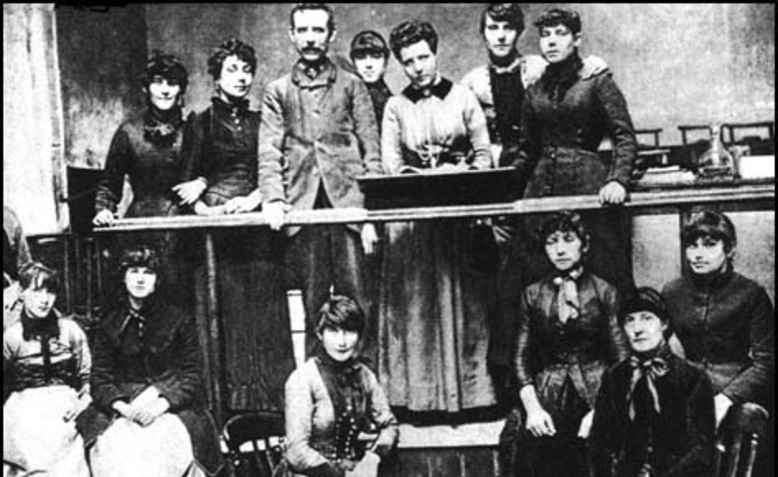 Annie Besant and the Matchgirls Strike Committee. Photo: wikimedia commons
Annie Besant and the Matchgirls Strike Committee. Photo: wikimedia commons
There’s nothing new in the ruling class sending working-class people to work in life-threatening conditions, argues Louise Raw
The Daily Mail would have LOVED Hans Christian Anderson’s ‘Little Matchgirl’.
The paper currently castigating teachers’ unions as unpatriotic leftist cowards for not wanting teachers or pupils to die, has been aggressively anti-lockdown for some time – for the working-classes, anyway.
The right have been fairly unanimous in their desire for workers to be forced back to producing profits for the rich – and keeping their children out of the way so they can enjoy that money.
They would doubtless have called Anderson’s Little Matchgirl a ‘hero’.
In the poem, an unnamed child matchseller, bare footed in the snow, succumbs to starvation and exhaustion, dying in the corner of a city street.
But she does so silently: her death is tragic but decorous: there is no anger or shouting about workers’ rights. Accordingly, she’s rewarded by being lifted into heaven in her dead grandmother’s arms.
Victorian journalists and their readers raised on this nursery staple got quite a shock when they first encountered the REAL matchwomen of East London, during their strike in 1888.
Bryant & May were a household name and huge economic player, with factories around the country and a major export business. The sons of the original Mr Bryant were in charge by 1888: ruthless capitalists in the modern style, working the press, well-connected to senior politicians, and producing vast (20%) profits for shareholders.
They’d formed cartels by buying out rival firms, and driven wages so far down, matchmakers earned LESS than in 1878.
The results were written on the bodies of the youngest girls; pre-pubescent when they began work and too malnourished to develop properly, they looked small and frail.
Forbidden to unionise, they seemed utterly powerless. Meanwhile the Bryants purchased huge country estates and dined with prime ministers.
But they underestimated their workforce. The women were mainly Irish in decent, though I’ve discovered some were Jewish as well as protestant: despite religious divides outside the factory they were united within it, with absolute loyalty and solidarity
When the women spoke to the press about their conditions in 1888, Bryant &May were as furious as any NHS manager today when a nurse speaks about lack of PPE. They sacked one girl for ‘whistleblowing’ in an attempt to frighten the rest which backfired spectacularly.
The women laid down their tools and walked out.
As they streamed out of the huge matchworks on Fairfield Road, Bow, they faced an uncertain future – the firm could have, and indeed threatened to, sack them all immediately.
But they used what they had: numbers and unity. Parading the streets of the East End, 1,400 strong, they sang songs about their strike to attract attention and collect funds – people threw coins from windows which the women deftly caught in their work aprons.
The press at first condemned them as people of ‘the worst kind’, and feared revolution: but the women kept up the pressure, holding mass meetings and marching to parliament to meet MPs.
The tide began to turn. As share prices tumbled their furious multi-millionaire bosses were forced to submit to their terms: better pay and conditions, a dining room away from the white phosphorus fumes that caused ‘phossy jaw’ – and the right to form the largest union of women and girls in the country.
The message to us today? Imitate the Matchwomen, so that no-one has to die the lonely death of a Little Matchgirl.
Louise Raw is a historian, broadcaster and activist. She is the author of Striking a Light: The Bryant and May Matchwomen and their Place in History and organiser of the annual Matchwomen Festival. Counterfire is growing faster than ever before We need to raise £20,000 as we are having to expand operations. We are moving to a bigger, better central office, upping our print run and distribution, buying a new printer, new computers and employing more staff.Before you go

